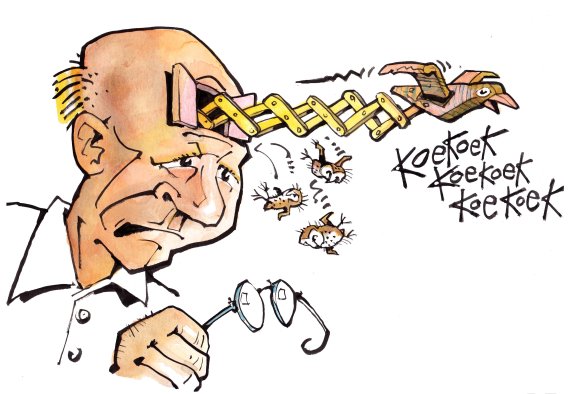Mei Li Vos – MP for the PvdA (labour party)

‘In most sectors 20 percent of staff are in the flexible layer. At universities, including PhD candidates, that percentage averages 60 percent. If you are so unable to predict how many people you are going to need, you have simply got a bad personnel policy. With a good policy you get to know people, make clear agreements and if one of the two parties does not keep to them, you part company. Once you know someone you trust them to carry on winning contracts. And if at some point they don’t manage it, you pay them from the basic funding. ‘Good personnel policy takes time. You have to hold performance evaluations, talk about careers and in-service training. I’ve heard terrible stories of scientists who have never had these sorts of discussions. There is only targeting numbers: does someone bring in money, do they have enough publications? No one looks at what people mean for the university in substantial terms. Precisely in science, this is damaging, given that you want the knowledge to grow in people’s heads.’
Maarten Smulders – Associate professor of Organic Chemistry

‘Temporary contracts go with the times. You don’t find jobs for life anywhere anymore. Personally, my temporary contract doesn’t affect me very much. In tenure track it is true that I continuously have to prove myself before I finally get a permanent contract. But then you do get a clear career path, and that’s worth something too. In the old situation you had a permanent contract but the conditions were not very clear. That way there was scope for political decisions and you got the feeling you’d better make friends with the dean. ‘Short contracts haven’t affected me negatively in my private life either. I did two and a half years in Cambridge as a postdoc. My girlfriend studied there at the same time so we both make a career move. It is true that you are only there temporarily and don’t build up anything but I didn’t experience that as a big personal sacrifice. I saw it above all as an opportunity.’
Eveline Verhulst – Postdoc at the laboratory of Genetics

‘Young researchers are certainly kept on a string for a relatively long time, on temporary contracts. That can cause problems in your private life because it is difficult to buy a house, for example. Postdocs get a contract of a maximum of three years but you usually have to start looking for another position earlier than that. I see promising scientists dropping out around me. Compared with the business world, they are underpaid and what is more, with a bit of luck they can get a permanent contract with a business. You need a very strong drive to carry on in science. I myself will carry on in science as long as I get contracts, before I switch to the business world.’ Many university researchers work on short-term contracts. A sign that universities have poor personnel policies, said labour party MP Mei Li Vos recently in parliament. Should more researchers get permanent contracts?
Johan van Arendonk – Dean of Sciences

‘I think in future we will actually work more with temporary contracts. That promotes mobility among scientists between groups and universities, and creates a dynamic. The university is a breeding ground for talent, but someone who goes on to work elsewhere is not lost to science. Of course you should treat people well. We know there isn’t the space to offer all PhD and postdoc researchers a permanent contract. That is not a problem either. We are therefore obliged not only to make sure that someone is useful to the group during their temporary contract, but that everyone gets the chance to develop themselves further.
Siavash Atashgahi – Postdoc at the Laboratory of Microbiology
 I am on a three year contract and I will most probably get another temporary contract, which could possibly lead to a permanent position in a long term. But that takes years. Meanwhile, this lack of long-term contracts puts postdocs in a weaker social position. For instance, it is impossible to get a long-term loan from the bank. The reasons for the university’s stance on temporary contracts are unknown to me. I understand that PhDs and postdocs that are unknown to the chair group cannot immediately be given a permanent position, but if a manager is satisfied with his/her people, he or she should be able to offer them longer (if not permanent)
I am on a three year contract and I will most probably get another temporary contract, which could possibly lead to a permanent position in a long term. But that takes years. Meanwhile, this lack of long-term contracts puts postdocs in a weaker social position. For instance, it is impossible to get a long-term loan from the bank. The reasons for the university’s stance on temporary contracts are unknown to me. I understand that PhDs and postdocs that are unknown to the chair group cannot immediately be given a permanent position, but if a manager is satisfied with his/her people, he or she should be able to offer them longer (if not permanent)
contracts, without policy restrictions.
Martin Herold – Professor of Geo-information Science and Remote Sensing

In Germany, and in many other countries, you have to move around if you want an academic career track. It is assumed that doing science requires looking around, exploring. And every time you move, you bring something new with you. That is inherent to the dynamic university system. But that said, I would also like to give people a longer term perspective. We are now losing talent to the corporate world, where they have more stability. The issue is how science is funded. Financing for research needs to be ‘earned’ and there is steep competition for funds that usually have a maximum time frame of 3 to 4 years. Under those circumstances you can’t hire people for a longer term. If you do, you can jeopardize the long-term sustainability of the entire group if the support base for research declines.

